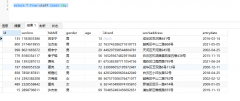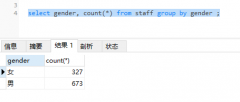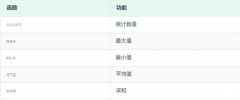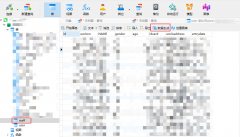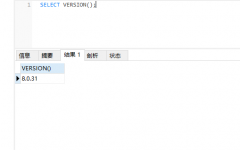Simplify Dynamic SQL Pivot Table(简化动态 SQL 数据透视表)
问题描述
我根据以下内容编写了一个动态数据透视表查询.这是一个 SQL FIDDLE 供参考.
I have written a Dynamic Pivot Table Query based on the following. Here is a SQL FIDDLE for reference.
CREATE TABLE TestTable1 ([idnumber] INT, [DataTypeId] INT)
GO
INSERT INTO TestTable1
VALUES (1, 108), (1, 108), (1, 108), (2, 108),
(2, 108), (3, 108), (1, 109),(1, 109),
(1, 110),(2, 110),(1, 111),(4, 108),(4, 108),
(4, 110),(4, 111)
GO
这是我写的动态 SQL
Here is the Dynamic SQL that I wrote
DECLARE @SQL NVARCHAR(MAX),
@Cols NVARCHAR(MAX),
@ColsP NVARCHAR(MAX)
SELECT @Cols = STUFF((select ',
ISNULL([' + CAST([DataTypeId] as varchar(10)) + '], 0) AS ''' + CAST([DataTypeId] as varchar(10)) + ''''
FROM
(
SELECT [DataTypeId] FROM [TestTable1]
GROUP BY [DataTypeId]
HAVING [DataTypeId] <> ''
) AS d
ORDER BY [DataTypeId] FOR XML PATH(''),type).value('.','varchar(max)'),1,2,'')
-- /////////////THIS IS WHAT I WANT REMOVED ////////////////////
SELECT @ColsP = STUFF((select ',
[' + CAST([DataTypeId] as varchar(10)) + ']'
FROM
(
SELECT [DataTypeId] FROM [TestTable1]
GROUP BY [DataTypeId]
HAVING [DataTypeId] <> ''
) AS d
ORDER BY [DataTypeId] FOR XML PATH(''),type).value('.','varchar(max)'),1,2,'')
-- /////////////////////////////////////////////////////////////
SET @SQL = 'SELECT idnumber,' + @Cols + '
FROM
(SELECT idnumber, COUNT([DataTypeId]) AS Total, [DataTypeId] FROM [TestTable1]
GROUP BY idnumber, [DataTypeId]
HAVING [DataTypeId] <> ''''
) p
PIVOT
(
SUM(Total) FOR [DataTypeId] IN (' + @ColsP + ')
) AS pvt
ORDER BY pvt.idnumber'
-- print @SQL
EXECUTE( @SQL)
我得到了我想要的结果:
I get the result that I want:
| IDNUMBER | 108 | 109 | 110 | 111 |
|----------|-----|-----|-----|-----|
| 1 | 3 | 2 | 1 | 1 |
| 2 | 2 | 0 | 1 | 0 |
| 3 | 1 | 0 | 0 | 0 |
| 4 | 2 | 0 | 1 | 1 |
但我相信它可以做得更好.我想删除填充变量的位置 @ColsP - SELECT @ColsP = STUFF((select...")
But I am sure it can be done better. I would like to remove where I populate the variable @ColsP - SELECT @ColsP = STUFF((select...")
应该有一种方法可以让我通过 TestTable1 只需一个循环即可创建此动态代码.如您所见,我循环了两次.一次读取要为 select 语句创建的列,一次读取 PIVOT 表.
There should be a way where I can create this dynamic code with just one loop through TestTable1. As you can see, I loop through it twice. Once to read what columns to create for the select statement, and once for the PIVOT table.
下面是动态 SQL 生成的代码:
Here is the code that is generated by the Dynamic SQL:
SELECT idnumber,
ISNULL([108], 0) AS '108',
ISNULL([109], 0) AS '109',
ISNULL([110], 0) AS '110',
ISNULL([111], 0) AS '111'
FROM
(
SELECT idnumber, COUNT([DataTypeId]) AS Total, [DataTypeId]
FROM [TestTable2]
GROUP BY idnumber, [DataTypeId]
HAVING [DataTypeId] <> ''
) p
PIVOT
(
SUM(Total) FOR [DataTypeId] IN ([108], [109], [110], [111])
) AS pvt
ORDER BY pvt.idnumber
推荐答案
您可以大大缩短您的代码.首先,您可以只使用 count 来聚合 PIVOT 中的数据.不需要内部计数来聚合数据或 HAVING 子句.最后,您只需要创建一次列列表.您可以轻松地将代码改进为:
You can shorten your code considerably. First, you can just use count to aggregate the data in the PIVOT. There is no need for the inner count to aggregate the data or the HAVING clause. Finally, you only need to create the list of columns once. You could easily improve the code to:
DECLARE @cols AS NVARCHAR(MAX),
@query AS NVARCHAR(MAX)
select @cols = STUFF((SELECT ',' + QUOTENAME(DataTypeId)
from TestTable1
group by DataTypeId
order by DataTypeId
FOR XML PATH(''), TYPE
).value('.', 'NVARCHAR(MAX)')
,1,1,'')
set @query
= N'SELECT idnumber, ' + @cols + N'
from
(
select idnumber, DataTypeId
from TestTable1
) x
pivot
(
count(DataTypeId)
for DataTypeId in (' + @cols + N')
) p '
exec sp_executesql @query;
请参阅 SQL Fiddle with Demo.这给出了相同的结果:
See SQL Fiddle with Demo. This gives the same result:
| IDNUMBER | 108 | 109 | 110 | 111 |
|----------|-----|-----|-----|-----|
| 1 | 3 | 2 | 1 | 1 |
| 2 | 2 | 0 | 1 | 0 |
| 3 | 1 | 0 | 0 | 0 |
| 4 | 2 | 0 | 1 | 1 |
这篇关于简化动态 SQL 数据透视表的文章就介绍到这了,希望我们推荐的答案对大家有所帮助,也希望大家多多支持编程学习网!
本文标题为:简化动态 SQL 数据透视表


基础教程推荐
- 带有WHERE子句的LAG()函数 2022-01-01
- 带更新的 sqlite CTE 2022-01-01
- MySQL 5.7参照时间戳生成日期列 2022-01-01
- 从字符串 TSQL 中获取数字 2021-01-01
- MySQL根据从其他列分组的值,对两列之间的值进行求和 2022-01-01
- ORA-01830:日期格式图片在转换整个输入字符串之前结束/选择日期查询的总和 2021-01-01
- 如何在 CakePHP 3 中实现 INSERT ON DUPLICATE KEY UPDATE aka upsert? 2021-01-01
- 使用 VBS 和注册表来确定安装了哪个版本和 32 位 2021-01-01
- CHECKSUM 和 CHECKSUM_AGG:算法是什么? 2021-01-01
- while 在触发器内循环以遍历 sql 中表的所有列 2022-01-01








